With Higher Ed Ally partnership, colleges and universities can easily add and offer high-quality and industry-relevant online Master of Science and graduate certificate programs, without the faculty burden and cost. Through this model program by Higher Ed Ally, institutions can easily add superior new programs in areas they do not have the capacity; advancing their reach, quality, competitiveness, and visibility.
Programs are meticulously designed to help individuals build expertise and develop new skills in specialized and exciting new fields to advance their knowledge and/or transition to more lucrative fields. The advantages are enormous for the participating institutions and students.
Master of Science Programs
Graduate Certificate Programs
Programs are meticulously designed to help individuals build expertise and develop new skills in specialized and exciting new fields to advance their knowledge and/or transition to more lucrative fields. The advantages are enormous for the participating institutions and students.
Master of Science Programs
Graduate Certificate Programs
M a s t e r o f S c i e n c e
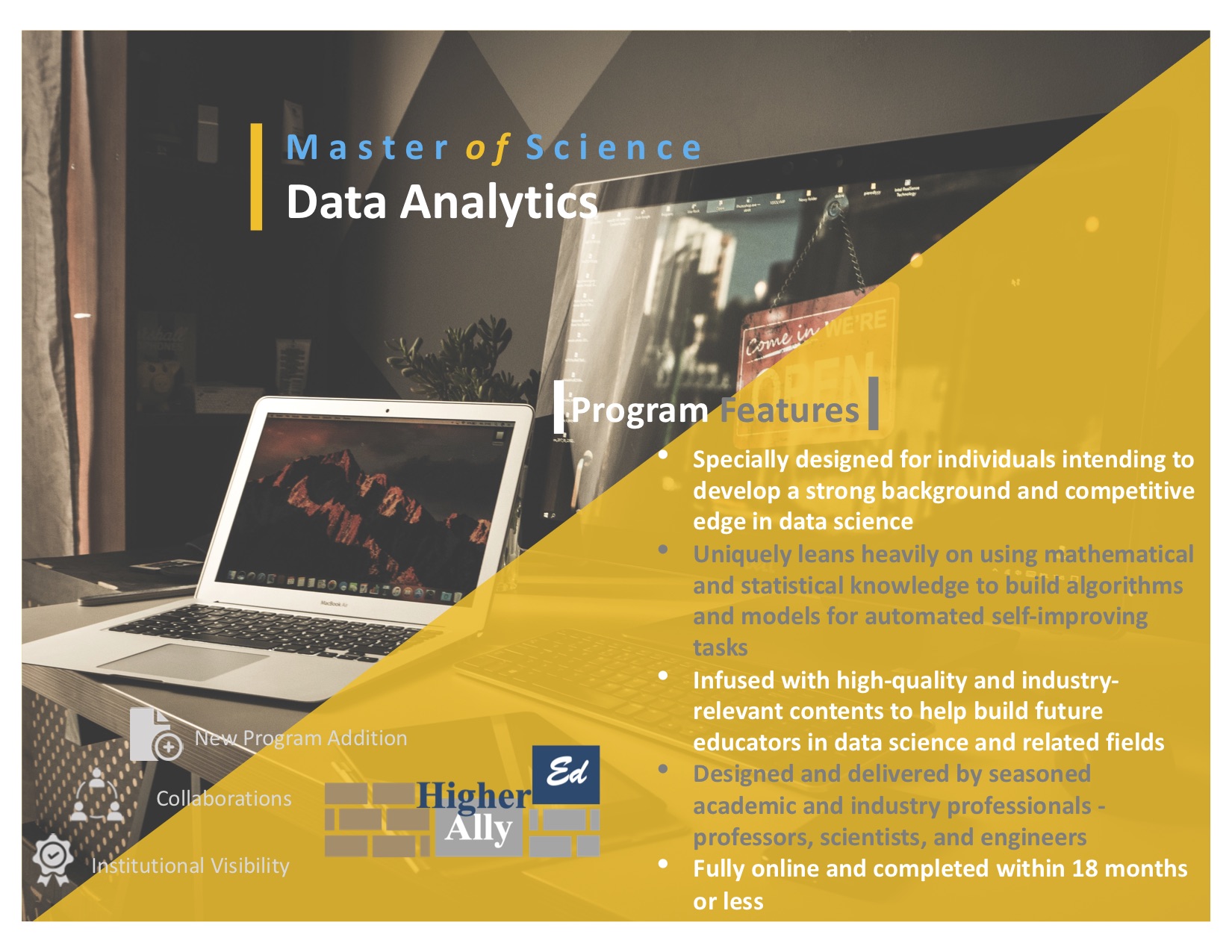
Master of Science in Data Analytics
Required Credits: 36
Prerequisite: Bachelor’s degree; familiarity with calculus and programming
Key Courses
Prerequisite: Bachelor’s degree; familiarity with calculus and programming
Key Courses
- Survey of Mathematical Methods (3.0 Credits)
- Programming Methods for Data Analytics (3 Credits)
- Data Mining (3.0 Credits)
- Machine Learning Applications (3.0 Credits)
- Applied Linear Algebra (3.0 Credits)
- Non-Linear Optimization (3.0 Credits)
- Probability and Statistics for Data Analytics (3.0 Credits)
- Machine Learning Theory (3.0 Credits)
- Neural Networks and Deep Learning (3.0 Credits)
- Big Data Analytics (3.0 Credits)
- Research (3.0 Credits)
- Scientific Manuscript Development (3.0 Credits)
Program Overview
Large amounts of data are continuously being produced in key sectors – including government, communication, manufacturing, and banking, to mention a few – that affect the global economy. Extracting and interpreting useful information from these large data sets requires a combination of mathematical, statistical, and programming tools. Data Analysts combine these tools to solve complex problems and make informed decisions. Data Analytics is one of the fastest growing fields in business, industry and government. According to the U.S. Bureau of Labor and Statistics, job growth in this field will increase by 30% in the next 10 years. The Master of Science in Data Analytics is designed for individuals intending to strengthen their analytical background and apply it in the ever-growing area of data science. The M.S. in Data Analytics is unique because, rather than focusing on applying already developed technology to organized datasets, it leans heavily on using mathematical and statistical knowledge to build algorithms and models that a computer system can use to perform automated self-improving tasks based on data patterns in its environment. This approach leads to analytical knowledge that is platform-invariant.
Large amounts of data are continuously being produced in key sectors – including government, communication, manufacturing, and banking, to mention a few – that affect the global economy. Extracting and interpreting useful information from these large data sets requires a combination of mathematical, statistical, and programming tools. Data Analysts combine these tools to solve complex problems and make informed decisions. Data Analytics is one of the fastest growing fields in business, industry and government. According to the U.S. Bureau of Labor and Statistics, job growth in this field will increase by 30% in the next 10 years. The Master of Science in Data Analytics is designed for individuals intending to strengthen their analytical background and apply it in the ever-growing area of data science. The M.S. in Data Analytics is unique because, rather than focusing on applying already developed technology to organized datasets, it leans heavily on using mathematical and statistical knowledge to build algorithms and models that a computer system can use to perform automated self-improving tasks based on data patterns in its environment. This approach leads to analytical knowledge that is platform-invariant.
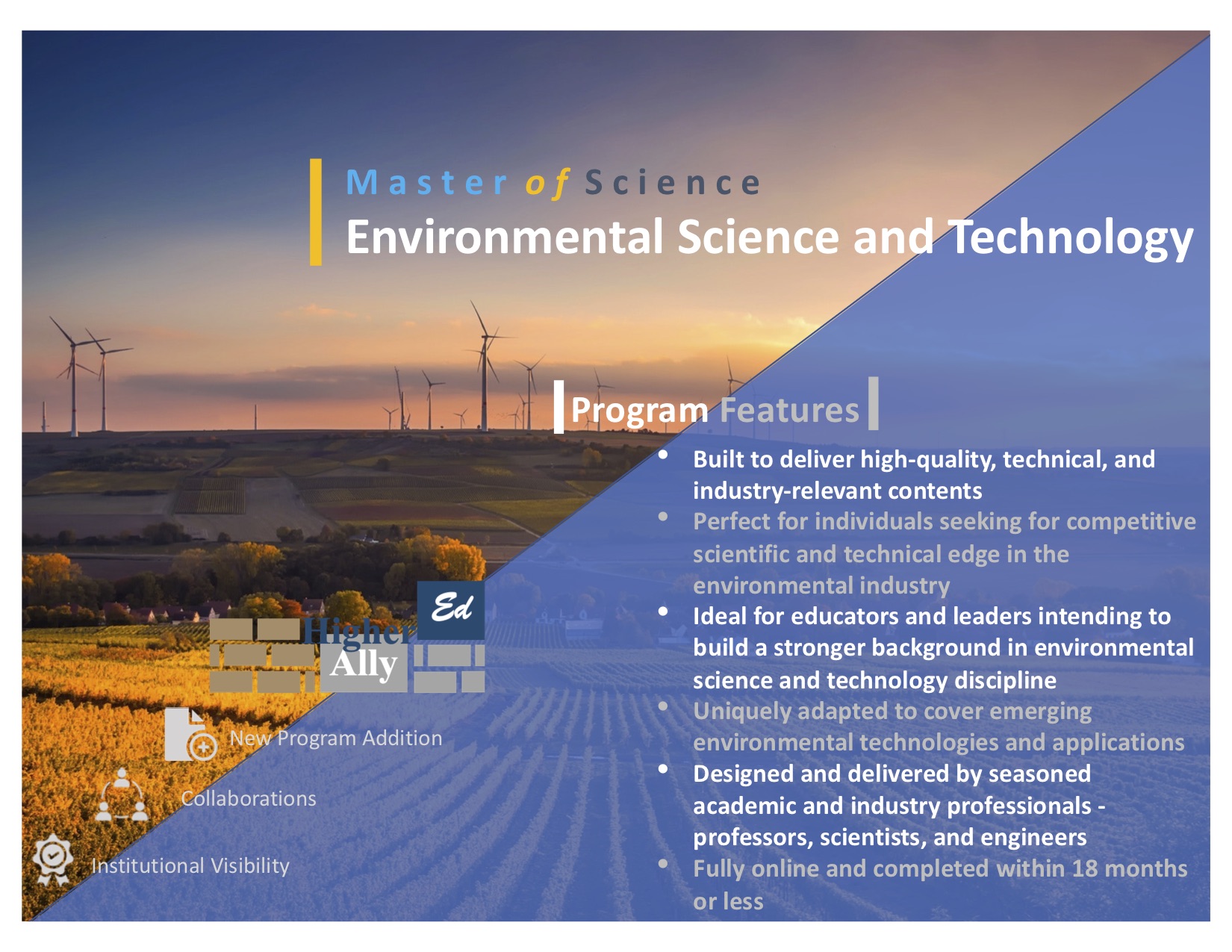
Master of Science in Environmental Science and Technology
Required Credits: 36
Prerequisite: Bachelor’s degree
Key Courses
Prerequisite: Bachelor’s degree
Key Courses
- Water, Air, and Soil Quality (3.0 Credits)
- Environmental Chemistry (3.0 Credits)
- Environmental Reclamation (3.0 Credits)
- Special Topics in Environmental Science (3.0 Credits)
- Selected Topics on Hydrology and Water Chemistry (3.0 Credits)
- Water Treatment Technologies (3.0 Credits)
- Global Water Issues and Laws (3.0 Credits)
- Environmental Toxicology (3.0 Credits)
- Environmental Soil Chemistry (3.0 Credits)
- Selected Topics in Environmental Soil Biology and Physics (3.0 Credits)
- Scientific Manuscript Development (3.0 Credits)
- Research (3.0 Credits)
Program Overview
The Master of Science in Environmental Science and Technology program is designed for individuals intending to strengthen their background or build new knowledge in core technical areas in environmental sciences. This program covers some key technical areas that are vital but often not covered in depth in regular environmental science programs, which often significantly vary among offering institutions. Emphasis is placed on chemical, physical, and biological processes in the environment as well as instrumentation, analytical techniques, and emerging technologies applied to environmental samples and reclamation. This is a perfect program for individuals intending to transition or already professionals in environmental fields, and other science and engineering fields with environmental components. It also serves the needs of educators in environmental fields who wish to strengthen their background. The changing climate and its effects on human existence have made environmental science a very important and lucrative field, with increasing needs for environmental professionals. This program will be administered by professors, scientists, engineers and other industry professionals in various environmental science and technology specializations.
The Master of Science in Environmental Science and Technology program is designed for individuals intending to strengthen their background or build new knowledge in core technical areas in environmental sciences. This program covers some key technical areas that are vital but often not covered in depth in regular environmental science programs, which often significantly vary among offering institutions. Emphasis is placed on chemical, physical, and biological processes in the environment as well as instrumentation, analytical techniques, and emerging technologies applied to environmental samples and reclamation. This is a perfect program for individuals intending to transition or already professionals in environmental fields, and other science and engineering fields with environmental components. It also serves the needs of educators in environmental fields who wish to strengthen their background. The changing climate and its effects on human existence have made environmental science a very important and lucrative field, with increasing needs for environmental professionals. This program will be administered by professors, scientists, engineers and other industry professionals in various environmental science and technology specializations.
G r a d u a t e C e r t i f i c a t e
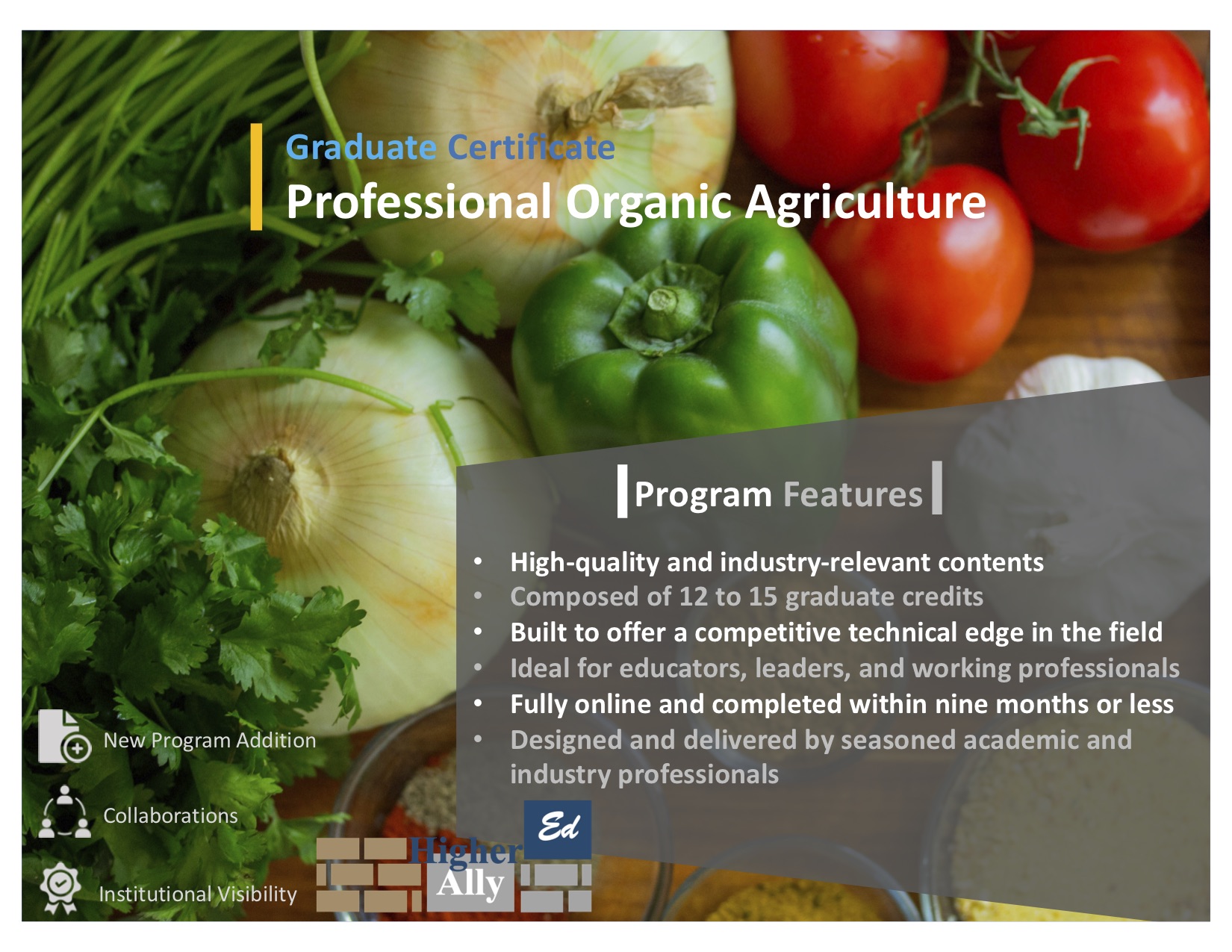
Professional Organic Agriculture
Required Credits: 12
Prerequisite: Bachelor’s degree
Key Courses
Prerequisite: Bachelor’s degree
Key Courses
- Advances in Agriculture (3.0 Credits)
- Special Topics in Soil Science (3.0 Credits)
- Principles and Practices of Organic Agriculture (3.0 Credits)
- Business Research and Planning (3.0 Credits)
Program Overview
The Professional Organic Agriculture program is designed for individuals aiming to develop a strong professional background in organic agriculture for business and for those in agriculture industry and government agencies interested in improving their technical knowledge base on organic and general agriculture. The global organic market continues to grow worldwide. The 2019 edition of the “World of Organic Agriculture” reports that as of 2017, there were 181 countries with organic activities, on 70 million hectares, and a total organic market of 97 billion US dollars (compare to 17.9 billion US dollars in 2000). The program courses are selected and structured to not only help participants develop a solid background in organic agriculture but to address some of the toughest technical challenges in the organic agriculture practice. This program will be administered by professors, scientists, and other industry professionals in the field of agronomy, environmental science, biotechnology, and business.
The Professional Organic Agriculture program is designed for individuals aiming to develop a strong professional background in organic agriculture for business and for those in agriculture industry and government agencies interested in improving their technical knowledge base on organic and general agriculture. The global organic market continues to grow worldwide. The 2019 edition of the “World of Organic Agriculture” reports that as of 2017, there were 181 countries with organic activities, on 70 million hectares, and a total organic market of 97 billion US dollars (compare to 17.9 billion US dollars in 2000). The program courses are selected and structured to not only help participants develop a solid background in organic agriculture but to address some of the toughest technical challenges in the organic agriculture practice. This program will be administered by professors, scientists, and other industry professionals in the field of agronomy, environmental science, biotechnology, and business.
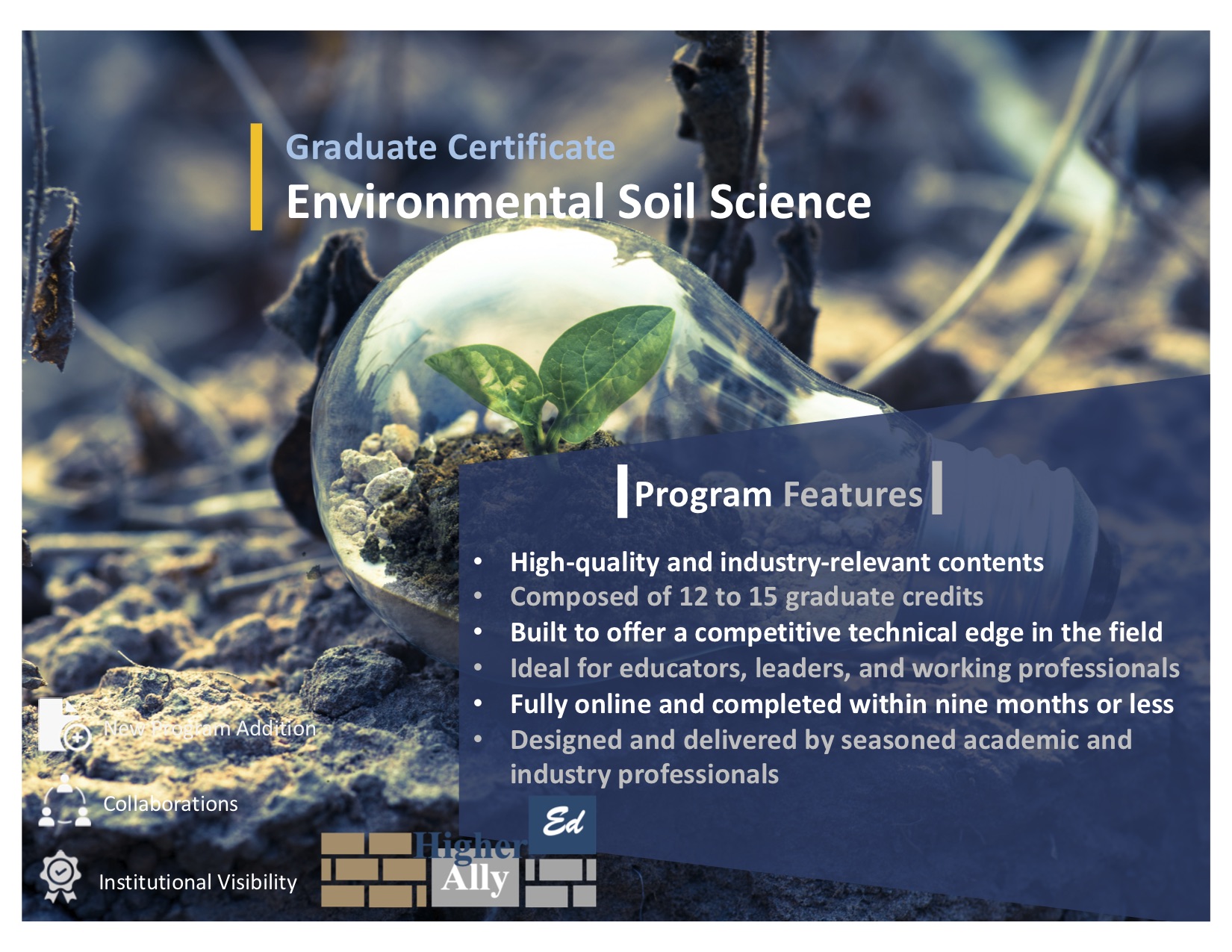
Environmental Soil Science
Required Credits: 12
Prerequisite: Bachelor’s degree
Key Courses:
Prerequisite: Bachelor’s degree
Key Courses:
- Environmental Soil Science (3.0 Credits)
- Environmental Soil Chemistry (3.0 Credits)
- Advanced Soil Fertility and Nutrient Management (3.0 Credits)
- Selected Topics in Environmental Soil Biology and Physics (3.0 Credits)
Program Overview
The Environmental Soil Science program is designed for individuals seeking to expand and advance their knowledge base in the field of soil science and related fields (such as geology and earth sciences). It is vital for individuals with professional interests or already professionals in environmental consulting, agriculture, and other science and engineering fields with environmental components. The soil is undoubtedly the source and sink of every visible thing around us. Its agricultural, environmental, health, and engineering significance and applications are apparent in our everyday activities. Evidence suggests that we will become more dependent on the soil to produce for us. At the end of this program, participants will develop a professional-level experience in soil and related sciences. This program will be administered by professors, scientists, and other industry professionals in the field of soil science, environmental science, agronomy, and agricultural chemistry.
The Environmental Soil Science program is designed for individuals seeking to expand and advance their knowledge base in the field of soil science and related fields (such as geology and earth sciences). It is vital for individuals with professional interests or already professionals in environmental consulting, agriculture, and other science and engineering fields with environmental components. The soil is undoubtedly the source and sink of every visible thing around us. Its agricultural, environmental, health, and engineering significance and applications are apparent in our everyday activities. Evidence suggests that we will become more dependent on the soil to produce for us. At the end of this program, participants will develop a professional-level experience in soil and related sciences. This program will be administered by professors, scientists, and other industry professionals in the field of soil science, environmental science, agronomy, and agricultural chemistry.
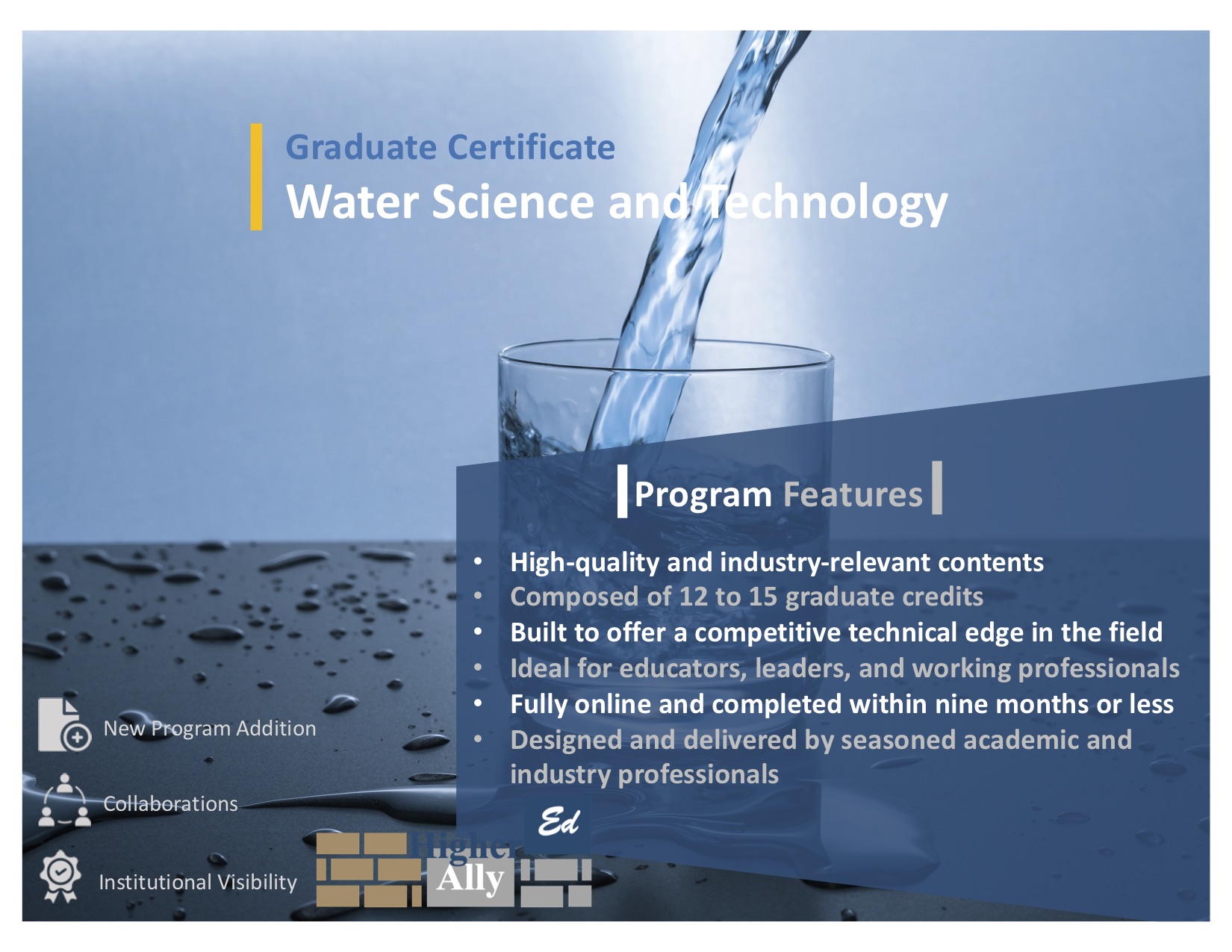
Water Science and Technology
Required Credits: 12
Prerequisite: Bachelor’s degree
Key Courses:
Prerequisite: Bachelor’s degree
Key Courses:
- Water, Water Quality and Analysis (3.0 Credits)
- Selected Topics on Hydrology and Water Chemistry (3.0 Credits)
- Water Treatment Techniques (3.0 Credits)
- Global Water Issues and Laws (3.0 Credits)
Program Overview:
The Water Science and Technology program is a special program designed for individuals seeking to develop new knowledge or build on their existing knowledge on water. The program cuts across key technical areas on the subject matter of water, making it suitable for individuals with science and/or engineering background as well as others seeking for opportunities or already professionals in water-related industry. It also serves the needs of educators who will be administering similar courses and wish to strengthen their background. Water covers about 70% of the earth's surface and it is intrinsically tied to the existence of life on earth. The changing climate has also drawn more attention to water resources as it impacts distribution, availability, contaminant concentration, etc. This special program will cover industry-relevant subject areas on water and will be administered by professors and industry professionals with experience in the professional relevance of the program.
The Water Science and Technology program is a special program designed for individuals seeking to develop new knowledge or build on their existing knowledge on water. The program cuts across key technical areas on the subject matter of water, making it suitable for individuals with science and/or engineering background as well as others seeking for opportunities or already professionals in water-related industry. It also serves the needs of educators who will be administering similar courses and wish to strengthen their background. Water covers about 70% of the earth's surface and it is intrinsically tied to the existence of life on earth. The changing climate has also drawn more attention to water resources as it impacts distribution, availability, contaminant concentration, etc. This special program will cover industry-relevant subject areas on water and will be administered by professors and industry professionals with experience in the professional relevance of the program.
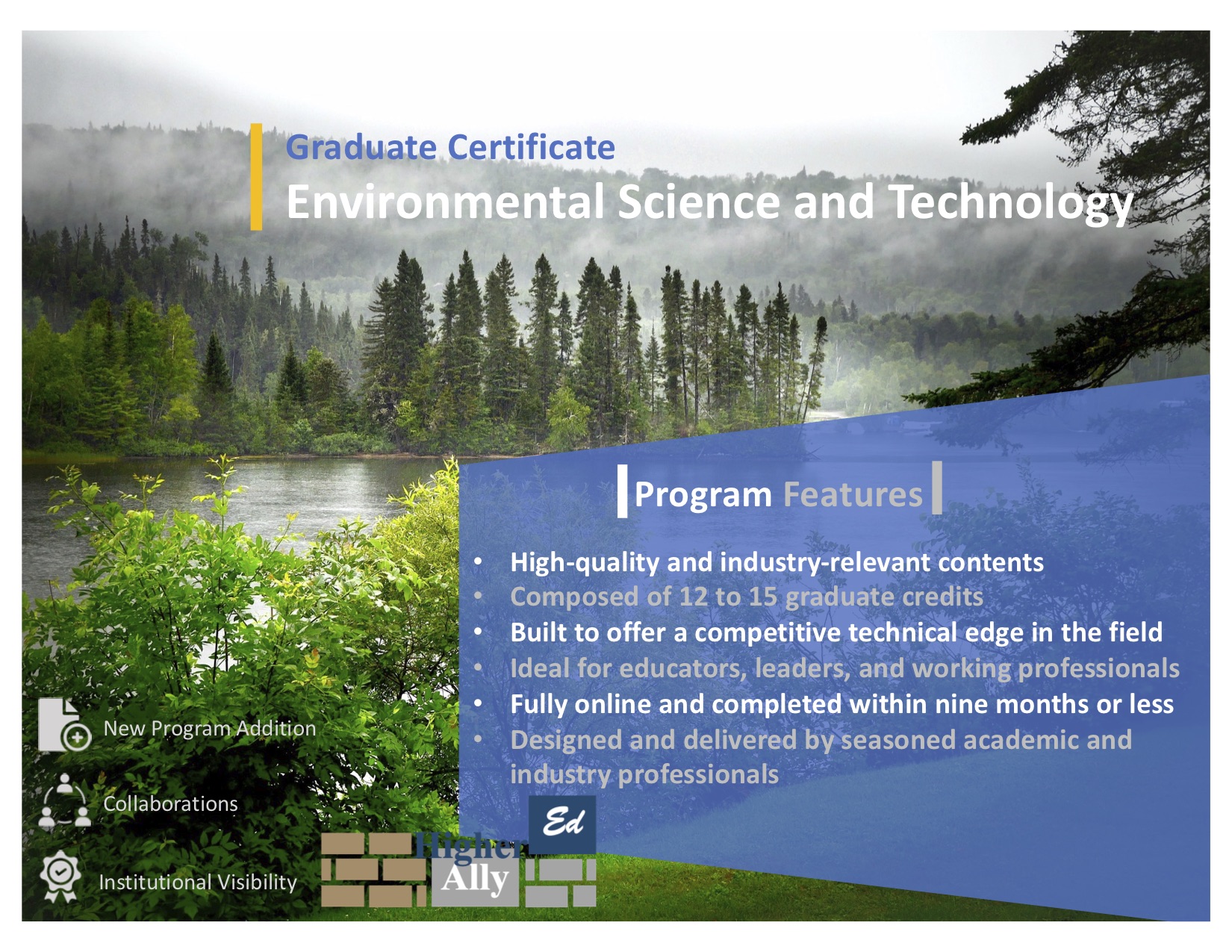
Environmental Science and Technology
Required Credits: 12
Prerequisite: Bachelor’s degree
Key Courses:
Prerequisite: Bachelor’s degree
Key Courses:
- Water, Air, and Soil Quality (3.0 Credits)
- Environmental Chemistry (3.0 Credits)
- Environmental Reclamation (3.0 Credits)
- Special Topics in Environmental Science (3.0 Credits)
Program Overview:
The Environmental Science and Technology program is designed for individuals intending to strengthen their background or build new knowledge in core technical areas in environmental sciences. This program covers some key technical areas that are vital but often not covered in depth in regular environmental science programs, which often significantly vary among offering institutions. This is a perfect program for individuals intending to transition or already professionals in environmental fields, and other science and engineering fields with environmental components. The changing climate and its effects on human existence have made environmental science a very important and lucrative field, with increasing needs for environmental professionals. This program will be administered by professors, scientists, engineers and other industry professionals in various environmental science and technology specializations.
The Environmental Science and Technology program is designed for individuals intending to strengthen their background or build new knowledge in core technical areas in environmental sciences. This program covers some key technical areas that are vital but often not covered in depth in regular environmental science programs, which often significantly vary among offering institutions. This is a perfect program for individuals intending to transition or already professionals in environmental fields, and other science and engineering fields with environmental components. The changing climate and its effects on human existence have made environmental science a very important and lucrative field, with increasing needs for environmental professionals. This program will be administered by professors, scientists, engineers and other industry professionals in various environmental science and technology specializations.

Data Analytics
Required Credits: 12
Prerequisite: Bachelor’s degree
Key Courses:
Prerequisite: Bachelor’s degree
Key Courses:
- Survey of Mathematical Methods (3.0 Credits)
- Programming Methods for Data Analytics (3.0 Credits)
- Machine Learning Applications (3.0 Credits)
- Data Mining (3.0 Credits)
Program Overview:
Large amounts of data are continuously being produced in key sectors – including government, communication, manufacturing, and banking, to mention a few – that affect the global economy. Data Analysts use computational tools to solve complex problems and make informed decisions. Data Analytics is one of the fastest growing fields in business, industry, and government. According to the U.S. Bureau of Labor and Statistics, job growth in the field of Machine Learning, Data Analytics, and Artificial Intelligence will increase by 30% in the next 10 years. This special program will cover industry-relevant subject areas on data analytics and will be administered by professors and industry professionals with experience in the fields of data science, computational mathematics, and machine learning.
Large amounts of data are continuously being produced in key sectors – including government, communication, manufacturing, and banking, to mention a few – that affect the global economy. Data Analysts use computational tools to solve complex problems and make informed decisions. Data Analytics is one of the fastest growing fields in business, industry, and government. According to the U.S. Bureau of Labor and Statistics, job growth in the field of Machine Learning, Data Analytics, and Artificial Intelligence will increase by 30% in the next 10 years. This special program will cover industry-relevant subject areas on data analytics and will be administered by professors and industry professionals with experience in the fields of data science, computational mathematics, and machine learning.
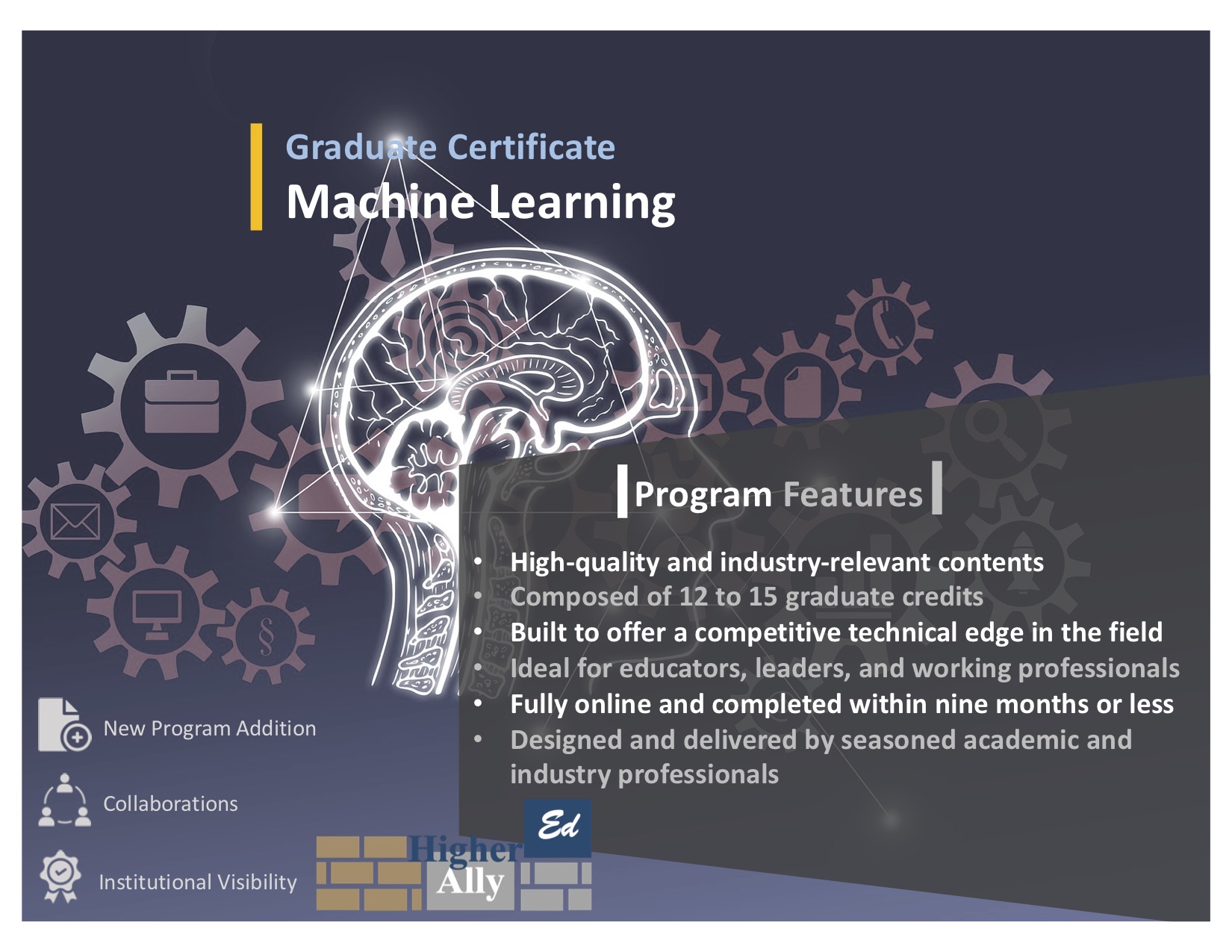
Machine Learning
Required Credits: 12
Prerequisite: Bachelor’s degree
Key Courses:
Prerequisite: Bachelor’s degree
Key Courses:
- Programming Methods for Data Analytics (3.0 Credits)
- Machine Learning Applications (3.0 Credits)
- Applied Linear Algebra (3.0 Credits)
- Machine Learning Theory (3.0 Credits)
Program Overview:
Machine Learning experts build algorithms and statistical models that a computer system can use to perform automated self-improving tasks based on data patterns in its environment. Machine Learning is one of the most important scientific fields today, as large amounts of data are continuously being produced in key sectors – including government, communication, manufacturing, and banking, to mention a few – that affect the global economy. Machine Learning experts combine mathematical, statistical, and programming tools to solve complex problems and make informed decisions. According to the U.S. Bureau of Labor and Statistics, job growth in the field of Machine Learning, Data Analytics, and Artificial Intelligence will increase by 30% in the next 10 years. This program will be administered by professors and industry professionals with proficiency in the fields of data science, computational mathematics, machine learning and their applications.
Machine Learning experts build algorithms and statistical models that a computer system can use to perform automated self-improving tasks based on data patterns in its environment. Machine Learning is one of the most important scientific fields today, as large amounts of data are continuously being produced in key sectors – including government, communication, manufacturing, and banking, to mention a few – that affect the global economy. Machine Learning experts combine mathematical, statistical, and programming tools to solve complex problems and make informed decisions. According to the U.S. Bureau of Labor and Statistics, job growth in the field of Machine Learning, Data Analytics, and Artificial Intelligence will increase by 30% in the next 10 years. This program will be administered by professors and industry professionals with proficiency in the fields of data science, computational mathematics, machine learning and their applications.
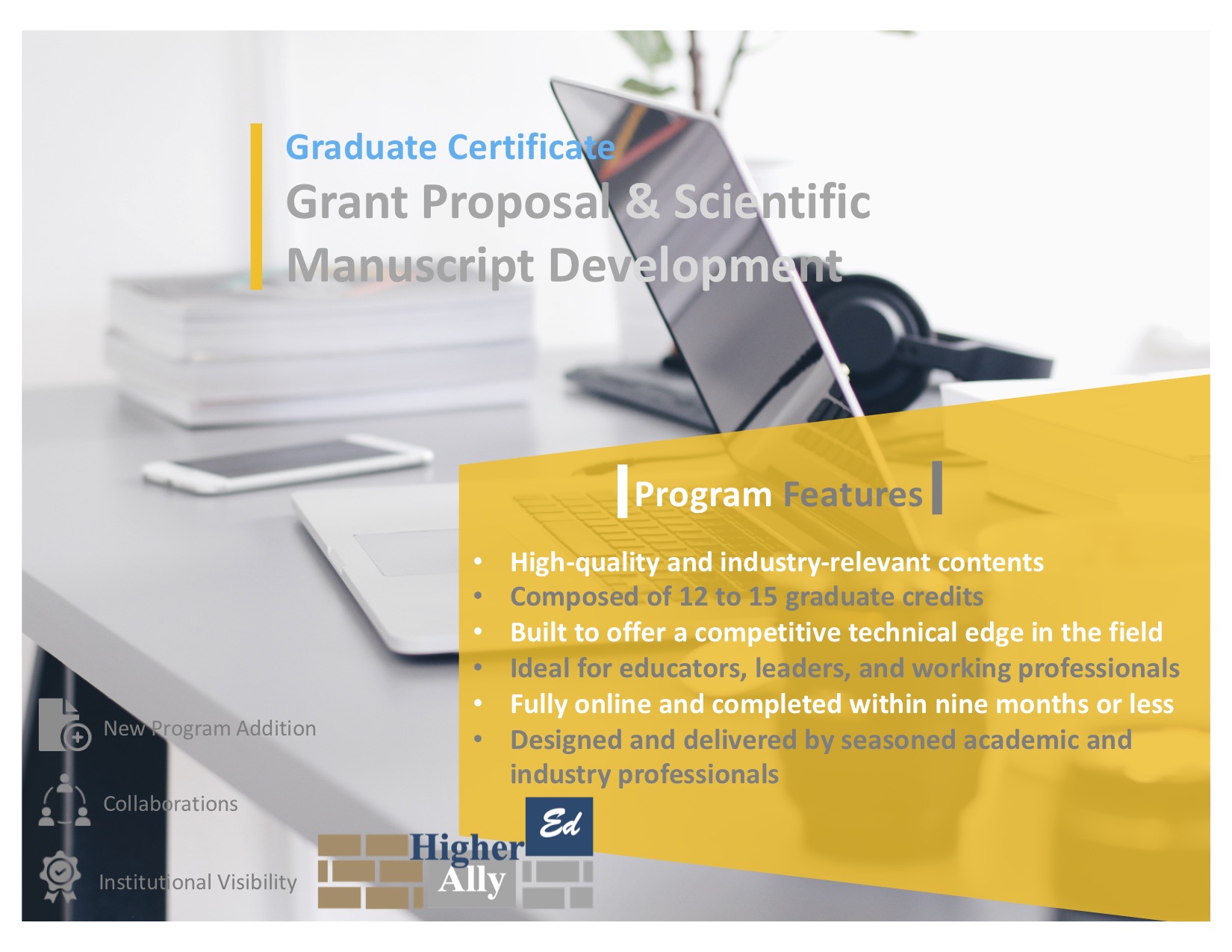
Grant Proposal and Scientific Manuscript Development
Required Credits: 12
Prerequisite: Bachelor’s degree
Key Courses:
Prerequisite: Bachelor’s degree
Key Courses:
- Grant Proposal for Government and Industry (3.0 Credits)
- Grant Proposal for Foundations and International Agencies (3.0 Credits)
- Scientific Manuscript Development (3.0 Credits)
- Writing for Peer-Reviewed Publications (3.0 Credits)
Program Overview:
Grant Proposal and Scientific Manuscript Development is a program designed because of the increasing need and demand, and tailored for individuals in academia, industry, and other sectors wishing to succeed in these two areas. It is no secret that grant proposal development (for external funding) is a challenge and success rate often narrow due to always limited resources. Likewise, the quest for novelty and scientific quality by journals, makes scientific manuscript preparation and the navigation of the journal review process a challenging task even for accomplished scholars. This program covers the cores of grant proposal development for government, private industries, foundations and international agencies; as well as the development of manuscripts for peer-reviewed publication. This program will be administered by professors, scientists, and other experts who have recorded success in these areas and have served on journal editorial boards and grant proposal review committees.
Grant Proposal and Scientific Manuscript Development is a program designed because of the increasing need and demand, and tailored for individuals in academia, industry, and other sectors wishing to succeed in these two areas. It is no secret that grant proposal development (for external funding) is a challenge and success rate often narrow due to always limited resources. Likewise, the quest for novelty and scientific quality by journals, makes scientific manuscript preparation and the navigation of the journal review process a challenging task even for accomplished scholars. This program covers the cores of grant proposal development for government, private industries, foundations and international agencies; as well as the development of manuscripts for peer-reviewed publication. This program will be administered by professors, scientists, and other experts who have recorded success in these areas and have served on journal editorial boards and grant proposal review committees.




